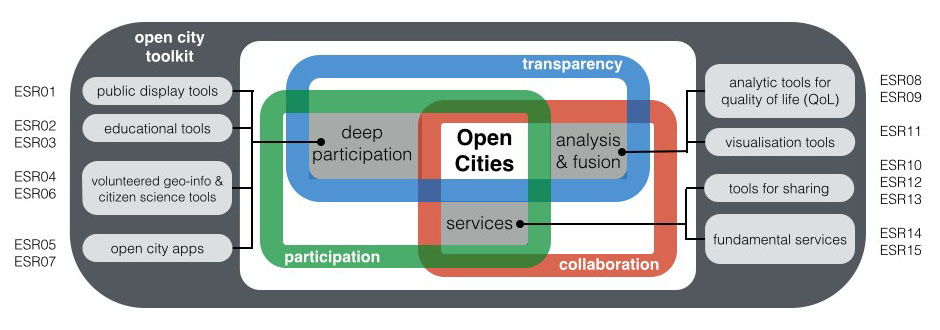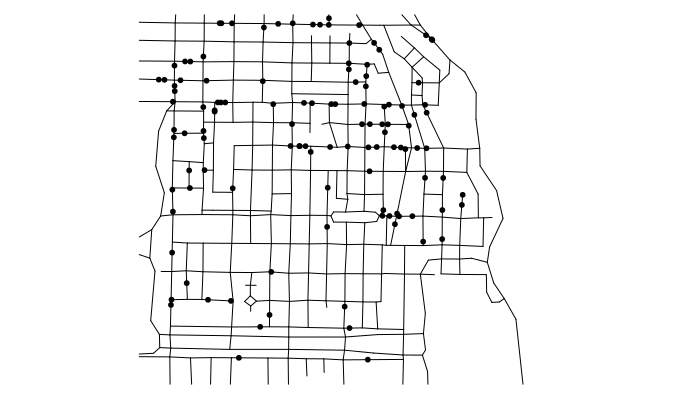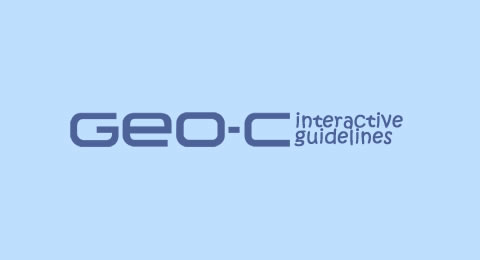VISION
GEO-C aims at increasing transparency, facilitating collaboration among citizens and enabling the participation of citizens in the improvement of their cities’ operations, quality of life, and local economy. The Open City Toolkit (OCT) is the resulting platform of the project, accruing in a single place all research outputs and contributions produced by the doctoral researchers. In essence, the OCT is a collection of tools, applications, services, datasets, specifications and guidelines to empower citizens to participate in and shape the future of their cities, and to deliver services based on open data that are useful for citizens, businesses and governing bodies alike.

EXAMPLES
Example tools are being added continually to the OCT, as they become available. Below are sample list of tools to improve transparency and enable citizen participation. The full list of components is accessible here


Crime Mapper
A web application for citizens & tourists to get a better overview of the crimes in Greater London.


Münster Households
An interactive map for citizens & city councils to see households data from Münster between 2010 and 2014 colourfully.

Münster Migration
An interactive map for citizens & city councils to go through migration statistics from Münster between 2010 and 2014 in a nice way.

Münster Population
An interactive map for citizens & city councils to browse population data from Münster between 2010 and 2014 in a pleasant way.

Münster SocialInsurance
An interactive map for citizens & city councils to get an idea about the number of employees subject to social insurance contributions in Münster between 2010 and 2014 in a nice way.

Münster Unemployment
An interactive map for citizens & city councils to explore unemployment data from Münster between 2010 and 2014 in a pleasant way.

OCT Transparency Module
A platform for citizens & city councils to visualize apps and data usage within the Open City Toolkit.

Place & City
A survey platform for city councils to collect data about how citizens' place perceptions, and their relationships, influence participation in a given urban area.

Referendum Map Münster
An interactive map for citizens & city councils to see results of the 2016 referendum regarding opening shops in the Münster city center in a nice way.
GUIDELINES

Location Privacy: what is it and why does it matter?

How to develop apps that respect the location privacy of users?

Heat-maps of street events (traffic accident, street crime, etc)

Meta-analysis of technology adoption

How to create an Interactive guideline?
LICENSING AND LONG-TERM PRESERVATION OF OCT COMPONENTS
Curated datasets are continually being uploaded to Zenodo. Source codes of applications generated within the project are accessible from GitHub. Both Zenodo and GitHub are safe, according to their product descriptions (check here and here). Data from the OCT is redistributed under the CCO license (the data can be reused and modified by anyone) or the CC-BY license (the data can be reused and modified by anyone provided that the data creator is credited on any copy of the data made). Software code is redistributed under the Apache v2 license (every interested party can reuse the code without worrying about patents owned by contributors to the OCT code). In summary, datasets and code from the OCT are available on (reliably stable) online platforms; they are perpetually reusable, without any charge.
DELIVERABLES
PUBLICATIONS ABOUT OCT
Warning: simplexml_load_string(): Entity: line 1: parser error : Space required after the Public Identifier in /users/apache/geo-c.uji.es/htdocs/right_contentRSS.php on line 17
Warning: simplexml_load_string(): <!DOCTYPE HTML PUBLIC "-//IETF//DTD HTML 2.0//EN"> in /users/apache/geo-c.uji.es/htdocs/right_contentRSS.php on line 17
Warning: simplexml_load_string(): ^ in /users/apache/geo-c.uji.es/htdocs/right_contentRSS.php on line 17
Warning: simplexml_load_string(): Entity: line 1: parser error : SystemLiteral " or ' expected in /users/apache/geo-c.uji.es/htdocs/right_contentRSS.php on line 17
Warning: simplexml_load_string(): <!DOCTYPE HTML PUBLIC "-//IETF//DTD HTML 2.0//EN"> in /users/apache/geo-c.uji.es/htdocs/right_contentRSS.php on line 17
Warning: simplexml_load_string(): ^ in /users/apache/geo-c.uji.es/htdocs/right_contentRSS.php on line 17
Warning: simplexml_load_string(): Entity: line 1: parser error : SYSTEM or PUBLIC, the URI is missing in /users/apache/geo-c.uji.es/htdocs/right_contentRSS.php on line 17
Warning: simplexml_load_string(): <!DOCTYPE HTML PUBLIC "-//IETF//DTD HTML 2.0//EN"> in /users/apache/geo-c.uji.es/htdocs/right_contentRSS.php on line 17
Warning: simplexml_load_string(): ^ in /users/apache/geo-c.uji.es/htdocs/right_contentRSS.php on line 17
Recent Posts
Acknowledgement
GEO-C is funded by the European Commission within the Marie Skłodowska-Curie Actions, International Training Networks (ITN), European Joint Doctorates (EJD). The funding period is January 1, 2015 - December 31, 2018, Grant Agreement number 642332 — GEO-C — H2020-MSCA-ITN-2014.




